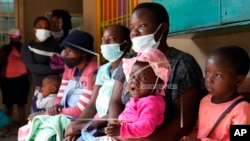There have been more than 45,000 reported cases in Africa this year, killing more than 2,300 people. That is double the number of cases at this time last year, when some lingering social distancing measures may have slowed infections.
"We've never seen the number of unimmunized children that we're seeing now," said Dr Deblina Datta, head of the global measles elimination effort at the U.S. Centers for Disease Control and Prevention.
"I have stood at the bed of children dying from measles, and it's a shocking thing to see. And this is a preventable event."
The U.S. CDC has identified 12 African countries as having no clear plans or secured resources for their next measles vaccination drive. Chad, Mali and Liberia, where vaccination rates lie between 55% and 70%, are at particular risk, it said.
In a recent document shared with governments and health organizations and reviewed by Reuters, the World Health Organization [WHO] outlined 15 vaccination campaigns that should be starting in Africa in 2022 and 2023. But an October update showed that only three of these campaigns had specific start dates. The rest were marked either 2022 or 2023, then "??" in the month and day section, by the WHO team.
The WHO and UNICEF launched an awareness and fundraising campaign in 2020 to cover gaps in inoculations caused by the pandemic, particularly in middle-income countries, but have raised almost no money, the agencies told Reuters.
The estimated shortfall for measles globally: at least $255 million. COVID, war in Ukraine, food shortages and inflation have squeezed donations from wealthier nations, the agencies said.
"Our current resources won't be enough should countries step up their requests for funding needed to respond to the increasing number of measles outbreaks," WHO spokesperson Margaret Harris said.
Health officials at Bundung Hospital in Gambia said the measles vaccine shortage there was temporary, the result of a bump in demand for routine immunizations, but it highlights how precarious underfunded health systems can be in countries already overstretched by COVID.
In 2019, global cases soared to a 23-year high, killing 200,000 people, including in countries where the disease had previously been eliminated. Democratic Republic of Congo was one of the worst-hit countries, with more than 6,000 deaths.
At the time, 86% of children had at least the first dose of the measles vaccine worldwide, according to WHO estimates. By 2021, when 25 million children around the world missed their first dose, just 81% were reached, the lowest figure since 2008. In Africa, it is just 68%.





